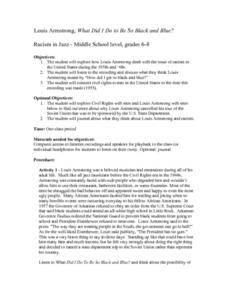Curated OER
Who Fought for the Union?
Learners read New York Times articles, letters, and listen to songs written from a soldier's perspective during the Civil War in order to understand who was fighting in the Union Army. This is a great instructional activity, complete...
Curated OER
Concept Formation Lesson Plan: Understanding "Protest"
After analyzing both examples and non-examples of a variety of protests conducted by ethnic groups in Seattle and the state of Washington during the twentieth century, your class members will work to identify the key ideas and...
Curated OER
Songs of Protest/Songs of Unity: 1865 to the Present
Students study song-poems from 1865 to the present. They explore the works of Woody Guthrie and the Almanac Singers (including Pete Seeger).
Curated OER
Racism in Jazz
Students listen to the Louis Armstrong song, "What Did I Do to Be So Black and Blue?" and consider it as a protest song. They write in their journals about Armstrong, his music, and civil rights.
Curated OER
The Impact of the IWW on the Nation or Who were the Wobblies?
Students evaluate the role labor groups had on the U.S. Government in the early 1900's. In this teaching American history lesson, students complete several activities, including response writing and listening to music, that...
Other
Labor Arts: Solidarity Forever: A Look at Wobbly Culture
An excellent collection of artifacts that highlight the aims and aspirations of the Industrial Workers of the World (IWW). Members of the IWW, known as Wobblies, played a unique role in the American labor movement. Artifacts include...







